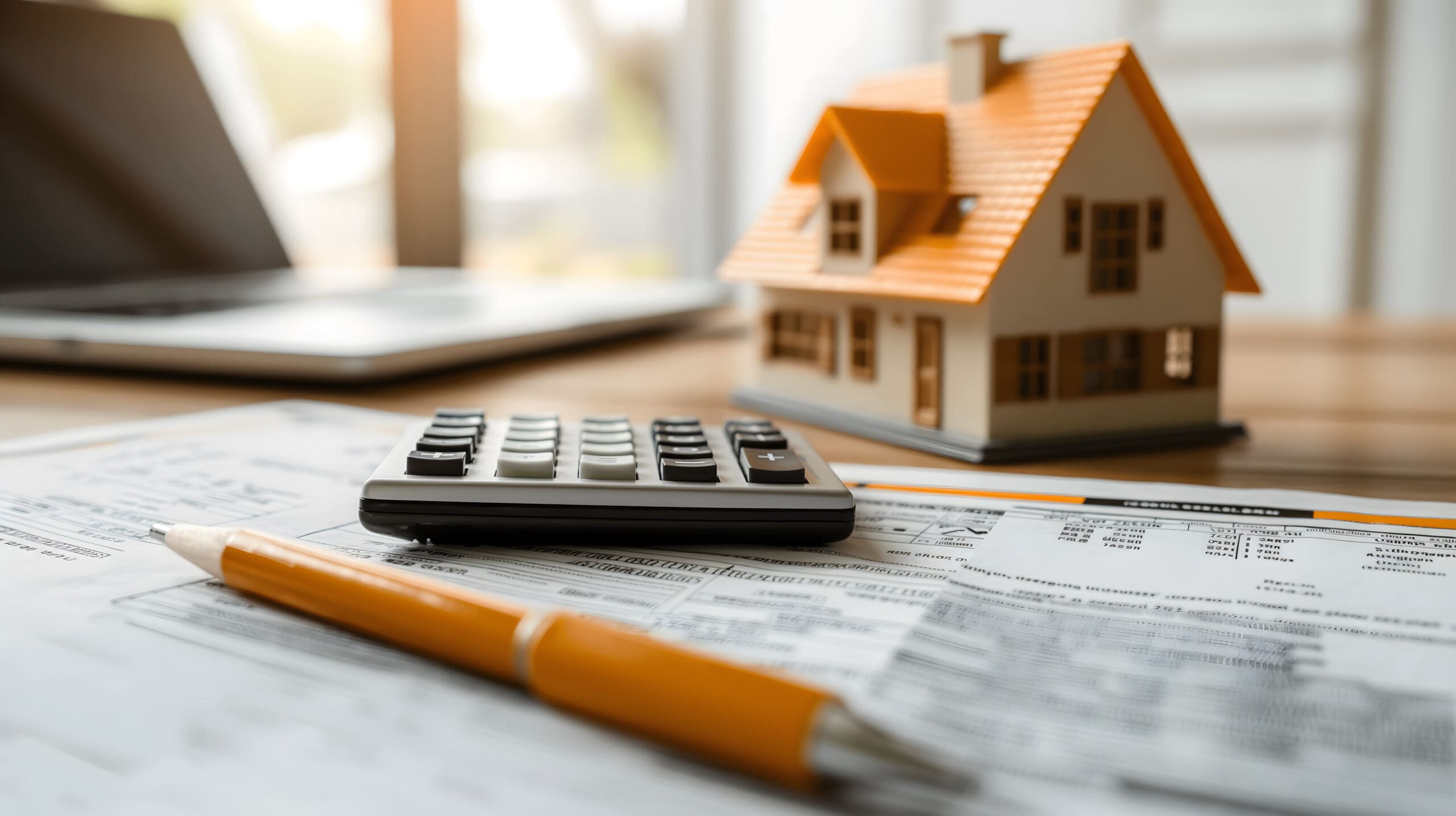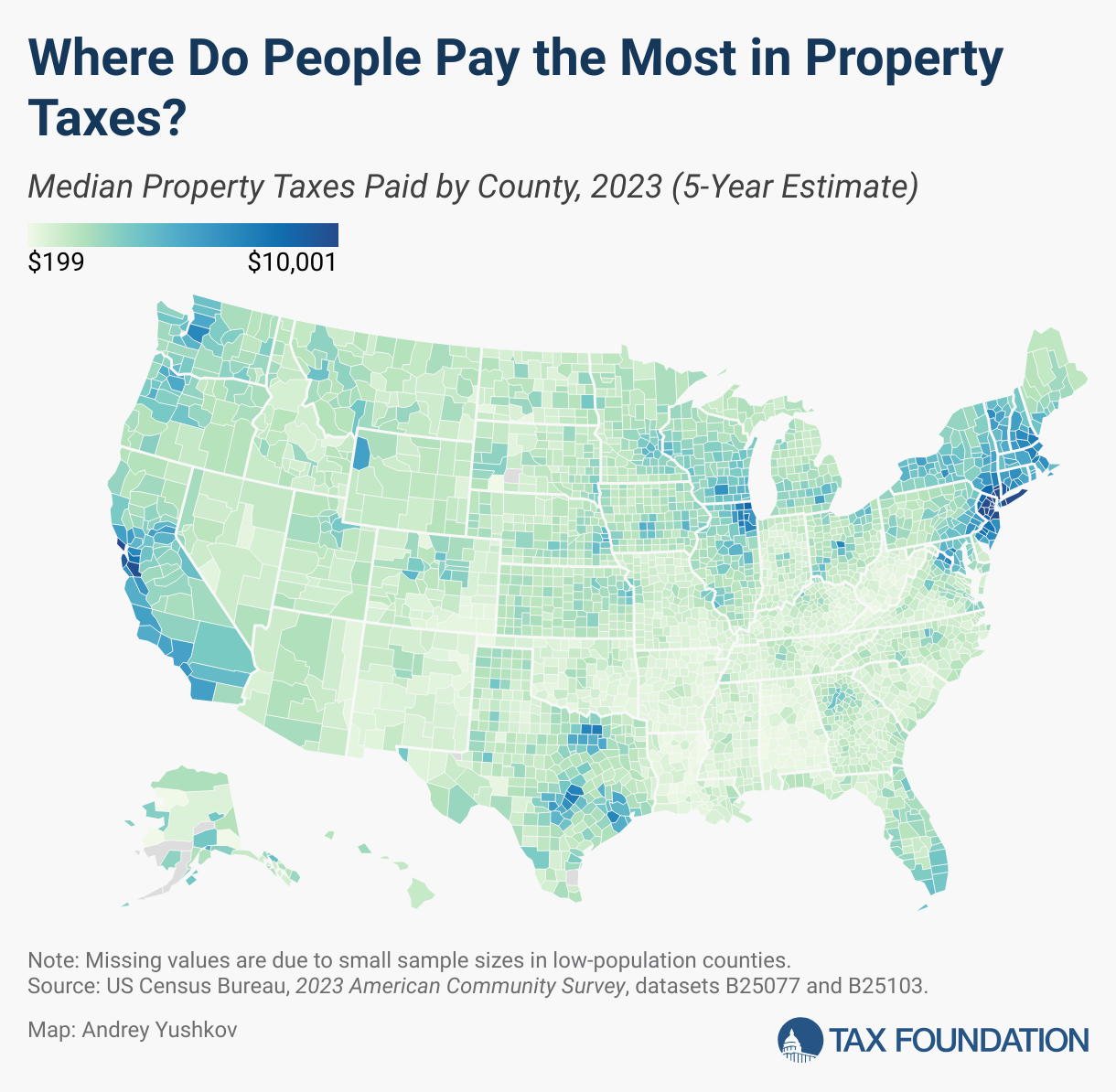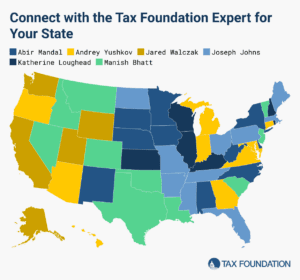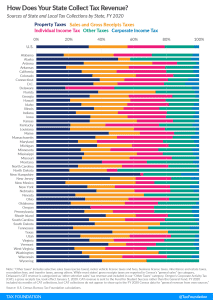The Issue
Property Values Are Increasing
Property values have skyrocketed in recent years, rising almost 27 percent faster than inflation since 2020, which yields dramatically higher property taxes in jurisdictions that fail to adjust millages (rates) downward. In just two years, the average sales price of a US home soared from $371,100 to $525,100. Legitimate taxpayer discontent over high property taxes is fueling a movement to significantly curtail or even eliminate the property tax in states like Colorado, Connecticut, Florida, Georgia, Indiana, Iowa, Kansas, Maryland, Montana, Nebraska, New Hampshire, New Jersey, North Carolina, North Dakota, Pennsylvania, South Dakota, Texas, and Wyoming.
Common but Flawed Proposals
Some Proposals—Including Assessment Limits and Abolishing Property Taxes—Create More Problems Than They Solve
Many of the property tax reform proposals offered by policymakers, like assessment limits and tax swaps (including full abolition of the property tax), create more problems than they solve, distorting property markets and undermining long-term housing affordability. Property taxes are the primary tool for financing local governments and the single largest source of state and local revenue in the US, helping fund schools, roads, police, and other services. The property tax plays an important role in public finance and is more efficient, pro-growth, aligned with benefits received, and generally better suited to municipal finance than any of the alternatives.
A Better Solution for Property Tax Relief
Property Tax Levy Limits
A better path forward would focus on sound tax policy solutions like narrowly tailored circuit breakers to help ensure that low-income families are not priced out of their homes and well-designed property tax levy limits that provide homeowners with much-needed relief from soaring property tax bills without the harms associated with other policy responses. Property tax levy (or revenue) limits are concerned with the actual amount of revenue raised by a taxing authority, imposing rollbacks or reductions to ensure that collections do not increase in aggregate above a given amount.
As the most effective, neutral, and responsible tool for states looking for property tax relief, well-designed property tax levy limits:
✔️ Constrain the growth of property taxes without distorting housing markets, undercutting economic growth, or shifting burdens onto new homeowners.
✔️ Prevent unlegislated tax increases that result from appreciation in property values, without anyone—local officials or taxpayers—ever casting a vote to raise taxes.
✔️ Keep property tax burdens in check without cutting the vital linkage between related assessed values (market value) and property owners’ tax liabilities (taxation).
Lawmakers can constrain the growth of property taxes without creating new problems. But the details matter.
Featured Resources
-

Confronting the New Property Tax Revolt
Policymakers can and should address taxpayers’ legitimate grievances about out-of-control property tax bills, but they should do so without upending a system of taxation that is more efficient, fair, and pro-growth, and better suited to municipal finance, than any of the alternatives.
39 min read -
 Podcast
PodcastUnderstanding the Property Tax
With property tax bills on the rise, homeowners are searching for answers—and some even want to abolish the tax altogether. In this episode, we break down why property taxes are increasing, common but flawed solutions, and why the property tax remains an economically efficient revenue source.
-

Property Taxes by State and County, 2025
Property taxes are the primary tool for financing local governments. While no taxpayers in high-tax jurisdictions will be celebrating their yearly payments, property taxes are largely rooted in the benefit principle of taxation: the people paying the property tax bills are most often the ones benefiting from the services.
9 min read

2025 State Tax Competitiveness Index
The State Tax Competitiveness Index enables policymakers, taxpayers, and business leaders to gauge how their states’ tax systems compare. While there are many ways to show how much state governments collect in taxes, the Index evaluates how well states structure their tax systems and provides a road map for improvement.
115 min read
2025 State Tax Resource Center
Fifty states, 7,383 state legislators, and over 100,000 bills: legislative sessions are a whirlwind. But the Tax Foundation and its state experts are here to help make sense of the key tax policy issues in state capitols.

Unpacking the State and Local Tax Toolkit: Sources of State and Local Tax Collections (FY 2020)
The mix of tax sources states choose can have important implications for both revenue stability and economic growth, and the many variations across states are indicative of the different ways states weigh competing policy goals.
29 min readFeatured Experts
Have a question about property taxes? Contact us to connect with a state tax policy expert or click on the experts below to request them as a speaker at your upcoming event.
-

Joseph Johns
Tax Policy Analyst
Related Research & Analysis

Localities Opt Out of Georgia’s New Homestead Tax Exemption
Policymakers may consider a broader, more comprehensive property tax reform that creates a uniform system with effective levy limits to prevent unauthorized increases in property tax revenues and, in most cases, property tax bills.
4 min read
North Dakota’s Property Tax Reform Proposals: A Three-Part Approach
North Dakota’s financial position provides it with a rare capacity to deliver meaningful property tax relief. However, policymakers must balance immediate relief with fiscal sustainability and ensure that local governments remain adequately funded in the years ahead.
5 min read
Indiana Mulls Local Income and Property Tax Reforms
This legislative session, local taxes are a major topic of debate in Indiana. Although the state’s property tax system is already nationally competitive, dramatic increases in assessed values have created discontent in recent years.
8 min read
Securing Property Tax Relief in Iowa
With such an important change to Iowa’s property tax system, it’s important that lawmakers get the details right.
33 min read
Kansas Policymakers Consider Variations of a Property Tax Levy Limit
As the property tax debate continues in Kansas, two new proposals have emerged that are much better structured, and would be more effective, than the assessment limits. However, policymakers should consider additional modifications.
7 min read
Montana Lawmakers Should Prioritize Transparency, Neutrality, and Competitiveness When Reforming the Property Tax
Montana’s 2025 legislative session has seen a flurry of property tax reform proposals, a response to the surge in property valuations in the state. Unfortunately, hasty decision-making can result in suboptimal policy outcomes.
6 min read
Nebraska Property Tax Relief After LB 34
Nebraska has an opportunity to revise the property tax package enacted in 2024 to ensure that Nebraskans enjoy meaningful property tax relief.
32 min readShare this tool: taxfoundation.org/property-tax





